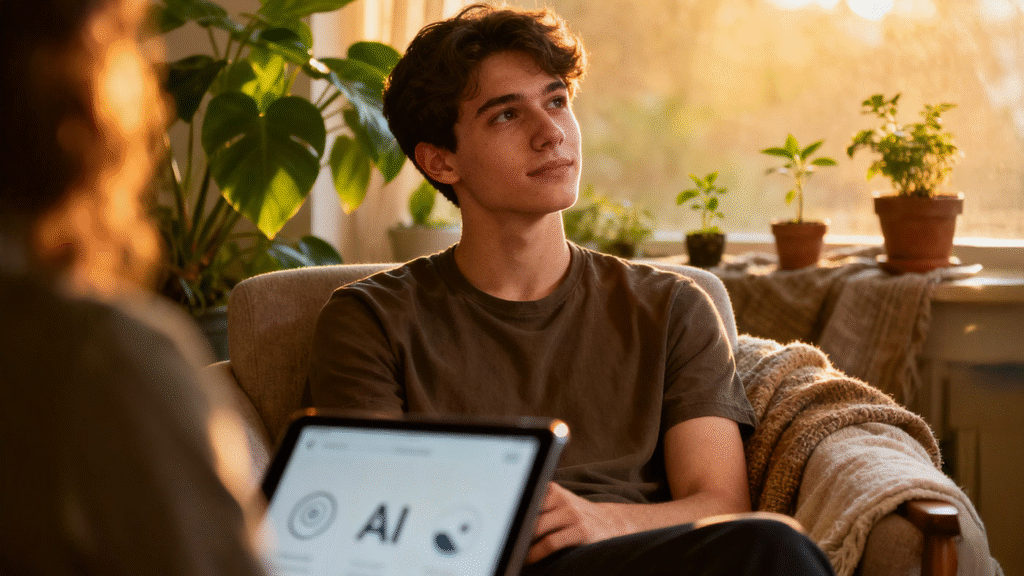
Your Health Magazine
4201 Northview Drive
Suite #102
Bowie, MD 20716
301-805-6805

More Mental Health Articles
When AI Meets Anxiety: Understanding Gen Z’s Digital Mental Health Paradox

Generation Z has grown up in an unprecedented digital era, and now they’re navigating an entirely new frontier: the age of artificial intelligence. Yet as AI tools become more embedded in their daily lives, a troubling pattern emerges. This generation that’s most comfortable with technology is also experiencing heightened anxiety about it.
Recent research reveals a striking contradiction: whilst 79% of Gen Z use AI tools and nearly half engage with them weekly, 41% report feeling anxious about AI technology. This isn’t merely digital hesitation. It’s a genuine mental health concern that’s adding another layer to an already complex psychological landscape.
The Perfect Storm: When Technology Amplifies Existing Struggles
Gen Z is already facing significant mental health challenges. Nearly half (46%) have received a formal mental health diagnosis, with anxiety leading as the most common condition, followed by depression. When we layer AI related stress onto existing mental health vulnerabilities, we create what researchers are calling “technostress”. This is a phenomenon where rapid technological adoption generates or exacerbates anxiety and depression.
The statistics paint a concerning picture. In workplace settings, 46% of Gen Z employees report feeling stressed compared to 35% of other generations, and this stress increasingly includes anxiety about AI replacing their jobs or making their skills obsolete.
Beyond Fear: Understanding the Real Impact
What makes AI related anxiety particularly complex is that it’s not simply about fear of the unknown. For many young people, it represents a deeper worry about human connection and purpose. As AI becomes more sophisticated, questions arise: “Will my work matter? Can I compete with machines? What does it mean to be human in an AI world?”
These concerns often manifest in surprising ways. Some young people report feeling overwhelmed by the constant pressure to stay updated with AI developments, whilst others experience a sense of inadequacy when comparing their abilities to AI capabilities. Research shows that AI dependence among adolescents increased from 17.14% to 24.19% in just one academic year, suggesting that what begins as helpful tool use can evolve into problematic reliance.
The Positive Potential: AI as Mental Health Ally
Yet there’s hope within this technological evolution. The same AI tools causing anxiety also offer unprecedented opportunities for mental health support. Gen Z is significantly more open to using AI for mental health purposes. Thirty-six percent express interest compared to 28% of other generations.
AI powered mental health apps can provide immediate support during difficult moments, offer personalised coping strategies, and make therapy techniques more accessible. For a generation that prefers digital communication and values instant access to resources, AI mental health tools can serve as valuable bridges to professional care.
Finding Balance in the Digital Age
The key lies not in avoiding AI technology, but in developing a healthy relationship with it. This means recognising when AI use becomes a way of avoiding real world connections or responsibilities, and understanding that technology should complement, not replace, human support systems.
For young people struggling with AI related anxiety, several strategies can help:
Acknowledge the feelings without judgment. Anxiety about rapid technological change is natural and valid. Rather than dismissing these concerns, it’s important to explore what they represent about deeper needs and values.
Focus on personal agency. While AI will continue evolving, individuals retain control over how they engage with these tools. Setting boundaries around AI use and choosing when to engage can restore a sense of personal empowerment.
Seek human connection. The irreplaceable value of human empathy, understanding, and genuine care becomes even more precious in an AI dominated world. Professional counselling provides a space where human connection and personal growth take precedence over technological solutions.
The Path Forward
As we navigate this new landscape, it’s crucial to remember that mental health challenges, whether related to AI anxiety or broader struggles, are deeply personal experiences that deserve compassionate, professional support. At In Focus, we understand that each person’s relationship with technology, change, and anxiety is unique, requiring an approach that honours their individual journey whilst building resilience for an uncertain future.
The conversation about AI and mental health is just beginning, but one thing remains constant: the fundamental human need for understanding, connection, and hope. Technology may change rapidly, but our capacity for growth, healing, and meaningful relationships endures.
If you’re finding that anxiety about AI or other life changes is affecting your daily well-being, remember that seeking support isn’t a sign of weakness. It’s an act of courage and self-care. Professional counselling can help you develop the tools and perspectives needed to thrive, regardless of what technological changes lie ahead.
Other Articles You May Find of Interest...
- Signs You Might Be Experiencing a Mental Breakdown: What You Need to Know
- Exploring the Different Types of Schizophrenia for Better Mental Health
- Self-Care Isn’t Selfish: Tips for Unlearning Guilt Around Rest and Healing
- Who Doesn’t Want To Feel Better Faster?
- The Evolution of Ketamine Therapy: From Clinics to At-Home Treatment
- Psychologist Vs Therapist Vs Counselor: Understanding the Differences
- How to Feel Less Stressed in the Long Term














